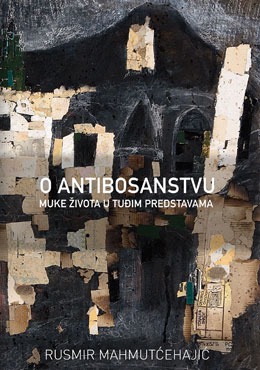Books

On the Anti-Bosnian Ideology: The Trials of Living under the Alein Gaze
On the Anti-Bosnian Ideology: The Trials of Living under the Alein Gaze
Rusmir Mahmutćehajić
Connectum, 2018.
Rusmir Mahmutćehajić
Connectum, 2018.
A New Book by Rusmir Mahmutćehajić
On the Anti-Bosnian Ideology: The Trials of Living under the Alien Gaze, Sarajevo: Connectum, 2018.
In February 2018, the Sarajevo publisher Connectum will publish a new book by Rusmir Mahmutćehajić, On the Anti-Bosnian Ideology: The Trials of Living under the Alien Gaze. This is the first thorough examination of the role of anti-Bosnian prejudice in the development of the Serbian and Croatian national ideologies. It is the result of the author's many years of research into the phenomenon and is informed by the contemporary critique of the ideological construction, subordination and oppression of "the enemy”.
To even begin to understand the contemporary drama of Bosnia and her people, we must first thoroughly examine anti-Bosnian ideology (anti-Bosnianism) and the role it plays in nationalist programmes in Bosnia and her neighbours. Serbia and Serbism, Croatia and Croatism, and the entire conceptual apparatus they provide in the construction of the modern Serb and Croat nations draw strength from confrontation and the escalation of conflict. By contrast, the denial of Bosnia and of any legitimate form of Bosnian identity is the key mechanism in depriving the people of Bosnia of a framework for their joint political subjectivity. This has been reinforced by strategies of cultural racism, orientalisation, and dogmatic secularism in the representation of Bosnia and her people. Aestheticising anti-Bosnian politics and politicising anti-Bosnian aesthetics are the twin pillars of the political and cultural programmes of anti-Bosnianism. The political projects built on them range from humiliation through persecution to wholesale slaughter. Their common aim is to deprive Bosnia of the capacity to oppose the nationalist teleologies of ideological Croatism and Serbism. Any vision for a political or cultural awakening of Bosnian identity as the ground and framework for the harmonious development of plural society is quickly undermined by the nationalist elites, through the imaginary generation of phantom political and theological enemies. The spectre of Bosnianism is introduced across all aspects of nationalist culture. This has exacerbated the vulnerability and dismemberment of the Bosnian people, prodding them continuously into a rage that serves to prove, for the nationalist elites, at least, the impossibility of any politics based upon sovereignty invested in Bosnian people.
In On the Anti-Bosnian Ideology, the author explores key aspects of the ideological contestation of Bosnian identity. Lessons from the philosophy of religion and political philosophy are applied for the first time to demonstrate the major political and cultural stakes in the debate over Bosnian identity, which always come back to whether a harmonious plural society is even possible in principle. This study aims to initiate a new turn towards the question of how to move forward, out of the current political and cultural plight of Bosnia and Bosnian identity, towards a better and brighter future.
Connectum press
Ajet Arifi



















 English
English